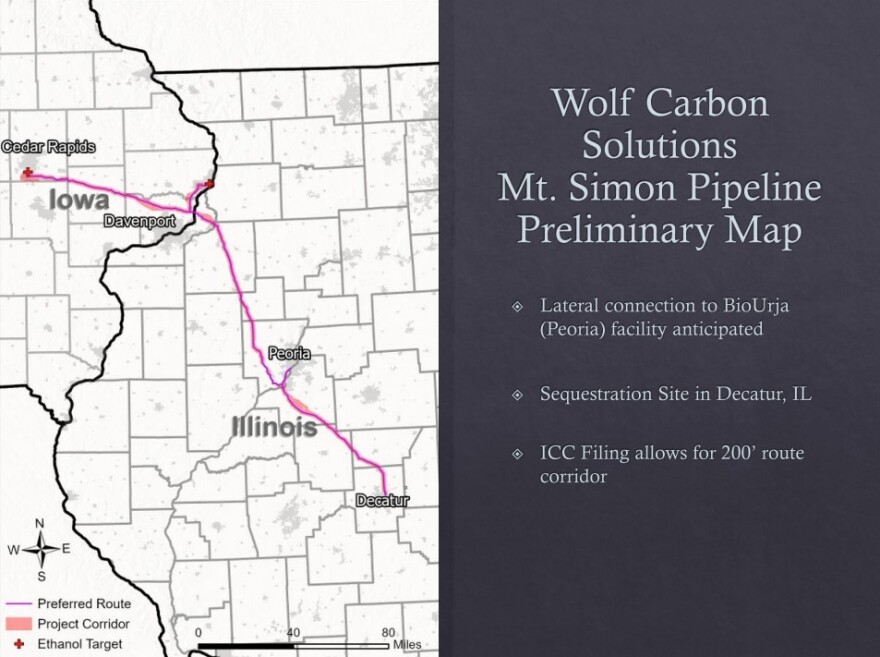The Peoria County Board Chair says the board will not draft a resolution for or against a proposed carbon dioxide pipeline from the company Wolf Carbon Solutions.
The announcement came following a presentation from Assistant Director of Planning and Zoning Andrew Braun, sharing all the information available about the 280-mile pipeline proposal to pump liquid carbon dioxide from Cedar Rapids, Iowa to a carbon sequestration site in Decatur.
“These industrial companies are producing carbon dioxide emissions that are being released into our ozone. The federal government has challenged the state and federal law to create programs and processes to capture this emission,” Braun explained to the board. “The gasses are cooled to temperatures that convert them into liquids, the liquids that are then transported through pipelines, and either reused or recycled for other uses, or pumped miles below the surface for storage.”
The Wolf Carbon pipeline plans to trunk off when running through Peoria County and collect emissions from the Alto plant in Pekin and BioUrja in Peoria.
Braun says the State of Illinois authorized a Carbon Dioxide Transportation and Sequestration Act in 2011, but there’s not been a pipeline built in the state yet. An economic impact study conducted through the University of Illinois estimates a $1.6 billion economic development factor in building pipelines.

Because the projects are sanctioned at a state level, Wolf will file with the Illinois Commerce Commission, not county or local government. After an extensive review process with the ICC, which Braun says typically takes about 11 months, the project will move onto the Pipeline and Hazardous Materials Safety Administration, or PHMSA. PHMSA will review emergency response plans and training plans for emergency responders.
Public meetings aren’t required in the process, but Braun says Wolf intends to hold them anyway.
“That may be at the county level that may be on more of a tri-county level,” said Braun. “Because the enormous length of the pipeline may not allow them to meet with each community individually.”

Wolf intends to own and operate the pipeline themselves, however we still don’t know the exact path the pipeline will take. Braun says the company has indicated they plan on staying 10 feet from the right of way and combining with other utilities when possible, but laws only require the company to specify the path within a range of 200 feet. The law also allow use of eminent domain to acquire land for the pipeline, but Braun says Wolf is planning to come to agreements with landowners at this time.
“This is a once you sign you’re committed forever,” said Braun. “Crop loss is assumed, they are acknowledging that and as part of their initial agreement, they're going to pay you on a de-escalating scale for four years for that assumed crop loss. They intend to construct using regional labor.”
The start of construction is still distant, Wolf is planning to file with ICC and start the process in April. Braun shared a tentative timeline from the company: construction could start late 2024 or early 2025, with the project in service by the fourth quarter of 2025 or the first quarter of 2026.
Braun also shared concerns with the board raised by the Coalition to Stop CO2 Pipelines in a February webinar. Among these concerns are the impact on agricultural land, the cost of training and equipping local emergency personnel to handle pipeline accidents, the reliance on federal subsidies for these private, for-profit projects, and responsibility for the safety and maintenance of the pipelines decades into the future.
The county board’s opportunity to be a part of the process comes during the ICC review, where interested parties can file as “interveners” to stay privy to all the information shared by Wolf Carbon Solutions throughout the process.
“There are sections of our code, both that planning and zoning and the highway department oversee, that we're going to take a look at and make sure,” said Jennie Cordis Boswell, Chief of the Civil Division at the State’s Attorney’s Office. “We're looking at things through this lens now, are we in a good position with our current county codes, to have some control over how things get done if a pipeline is permitted in this area.”
Some examples Boswell offers are controlling the creation of above ground structures, regulating roadwork and impacts on utilities and right of way.
“Past practices would be that we would intervene so that we receive data, but the county board would not take a position of pro or against the pipeline,” said board chairman James Dillon. “Since it will be decided by the Illinois Commerce Commission.”
Some board members, like Eden Blair, shared concerns and questions about the scientific evidence for the safety and efficacy of the carbon pipelines.
“Planting trees, trees don't generally explode and cause problems,” Blair said. “So I just wonder why this is better than other methods.”
Other board members were also cautious, though member Steven Rieker pointed out that some companies are already transporting carbon dioxide by train, and train accidents could be just as or more dangerous than pipeline ruptures.
Wolf Carbon Solutions is expected to file with the ICC, which will help make more information available to the public, in April. You can find the entire presentation given to the county board here.


